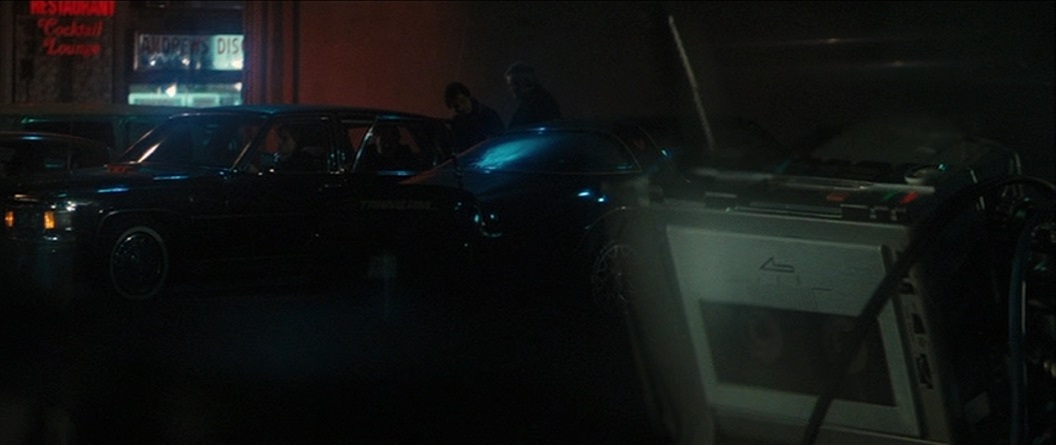DAN PIEPENBRING REVIEWS JAMES ELLROY'S NEW NOVEL, 'THE ENCHANTERS' - HARPER'S MAGAZINE

Yesterday's post included Nope producer Ian Cooper stating that he developed an obsession "with movie sound design vis-a-vis De Palma’s foley-forward masterpiece," Blow Out. "I watched this film on VHS in early high school," Cooper continued, "and the boots-on-the-ground-artistry depiction of Travolta’s character concretized the marriage of pragmatism and creativity that is the bedrock of the BTS of filmmaking."
For today, Hugh has sent over a link to a review of The Enchanters, the new novel by James Ellroy. The review by Dan Piepenbring at Harper's Magazine includes mention of Blow Out:
As far as detectives go, Charlie Siringo walked so Freddy Otash could run, loot, and pop Dexedrine. He’s the Tinseltown private dick who narrates The Enchanters (Knopf, $30), James Ellroy’s lush, manic novelization of Marilyn Monroe’s death and all that was hushed up around it. The book contains more than a kernel of truth: Otash was a real fixer known for his A-list imbroglios and disreputable methods, including “cramming an unbelievable assortment of electronic gadgetry into an ordinary sound truck,” the Los Angeles Times wrote in 1971, describing what was then state-of-the-art surveillance. He met Ellroy a few times and bragged that he’d bugged Peter Lawford, JFK’s brother-in-law. He said he’d heard a tape of the president and Monroe having sex.Ellroy called Otash a “bullshitter,” and The Enchanters runs on his bullshit—it embroiders an embroiderer. At the outset, Jimmy Hoffa hires Otash to spy on Monroe, mere months before her overdose, and generate a scandal sheet about her misdeeds with the Kennedy boys. Snooping around her Brentwood hacienda, he finds too many loose ends: forty grand in cash, a wardrobe belonging to a much larger woman, a list of her lovers alongside the main switchboard number for the sheriff’s office. There’s also a Jackie Kennedy voodoo doll rife with pins, and a secret compartment containing “fuckee-suckee pix” coated in semen. Underbellies don’t come any seamier than this. From there, the plot is off to the sordid races.
Ellroy’s last novel, Widespread Panic (which also starred Otash), has been described as “camp noir.” The Enchanters continues along the same lines and throws some erotic fan fiction into the mix. “We’re all fan-club fools run amok,” Otash says of himself and his fellow Monroe obsessives. Like Brian De Palma in Blow Out, Ellroy goes in for loving close-ups on the tools of the eavesdropper’s trade, the phone taps and hidden bugs. But they can’t compete with “scent and sensation,” Otash says: “I wanted to touch things that touched her. I wanted to be where she got lonely and cut loose.” When Otash has a porny nightmare about his tradecraft, Ellroy’s rat-a-tat sleaze is pitch-perfect:
Wall wires, rug clamps, refitted phone jacks. They’re changing colors and starting to fray. They’re squirming. They’re untangling out in plain view.
They wiggle. Bore holes leak Spackle. Discolored Spackle—alive with a glow.?.?.?. Tap wires pop through handset perforations. Mike installations explode.?.?.?.
They’re moving. They’re pure combustion. They’re out to set me aflame.
The detective’s bag of tricks is all voyeurism, like Hollywood’s. The town that gave us the Western and the AR-15 was—is—overrun by profane megalomaniacs who had no business shaping the nation’s dream life, but did it anyway. Curious about the historical Otash, I dug up a fawning 1959 profile from the Los Angeles Mirror, which offered this choice detail: “The only item lacking to keep him from becoming a TV hero,” it reads, “is a gun strapped under his shoulder.” Riding high in his Cadillac Eldorado convertible, Otash had decided he didn’t need to carry one.



